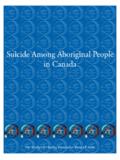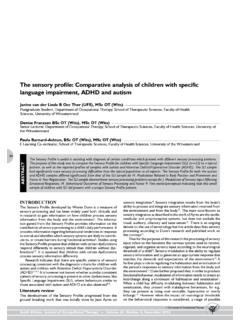Transcription of The Adult Developmental Coordination Disorder/ …
1 1 The Adult Developmental Coordination Disorder/ dyspraxia checklist (ADC) for Further and Higher Education (Kirby and Rosenblum, 2008) Please complete the following questionnaire giving as much information as you can. Please tick boxes as appropriate. It will take you about 10-15 minutes to complete this. All information given is dealt with in the strictest confidence. Name: Completed by: Date of Birth: Date completed: Address: Post Code: Tel no. or mobile phone no: E-mail: Name of School/College/University/workplace: Course being studied/place of employment: .. Year of study ( first year) .. Are you a: Part-time student? Full-time student? Are you in receipt of: Disability Student Allowance? Disability Living Allowance? Have you been diagnosed with any of the following? dyspraxia , Developmental Co-ordination Disorder, Clumsy Child Syndrome Dyslexia Attention Deficit Hyperactivity Disorder (ADHD), or ADD Asperger s Syndrome, Autism Spectrum Disorder Learning Difficulties, Disabilities Other Who diagnosed you?
2 Don t know When were you diagnosed?.. 2 Section 1: As a child, did you: Never Sometimes Frequently Always 1. Have difficulties with self-care tasks, such as tying shoelaces, fastening buttons and zips? 2. Have difficulty eating without getting dirty? 3. Have difficulty learning to ride a bike compared to your peers? 4. Have difficulties with playing team games, such as football, volleyball, catching or throwing balls accurately? 5. Have difficulty writing neatly (so others could read it)? 6. Have difficulty writing as fast as your peers? 7. Bump into objects or people, trip over things more than others? 8. Have difficulty playing a musical instrument ( violin, recorder)? 9. Have difficulties with organising/finding things in your room? 10. Have others comment about your lack of Coordination or call you clumsy? Total 3 Section 2: Do you currently have difficulties with the following items: Never Sometimes Frequently Always 1.
3 Self-care tasks such as shaving or make up? 2. Eating with a knife and fork/spoon? 3. Hobbies that require good Coordination ? 4. Writing neatly when having to write fast? 5. Writing as fast as your peers? 6. Reading your own writing? 7. Copying things down without making mistakes? 8. Organising/finding things in your room? 9. Finding your way around new buildings or places? 10. Have others called you disorganised? 11. Do you have difficulties sitting still or appearing fidgety? 12. Do you lose or leave behind possessions? 13. Would you say that you bump into things, spill or break things? 14. Are you slower than others getting up on the morning and getting to work or college? 15. Did it take you longer than others to learn to drive? (if you do not drive, please indicate on the paper and describe why you chose not to drive) 16.
4 Do others find it difficult to read your writing? 17. Do you avoid hobbies that require good Coordination ? 18. Do you choose to spend your leisure time more on your own than with others? 19. Do you avoid team games/sports? 20. If you do a sport, is it more likely to be on your own, going to the gym, than with others? 4 Never Sometimes Frequently Always 21. Do you/did you in your teens/twenties avoid going to clubs/dancing? 22. If you are a driver, do you have difficulty parking a car? 23. Do you have difficulty preparing a meal from scratch? 24. Do you have difficulty packing a suitcase to go away? 25. Do you have difficulty folding clothes to put them away neatly? 26. Do you have difficulty managing money? 27. Do you have difficulties with performing two things at the same time ( driving and listening or taking a telephone message)?
5 28. Do you have difficulties with distance estimation ( with regard to parking, passing through objects)? 29. Do you have difficulty planning ahead? 30. Do you feel you are losing attention in certain situations? Section two total Section one total questionnaire total [section one + section two] Can you describe any compensatory strategies or approaches that you have developed over the years in order to deal with Coordination difficulties in your everyday life? _____ The Dyscovery Centre often conducts research with adults . Please let us know if you would like to take part in future projects. Prof Amanda Kirby The Dyscovery Centre University of Wales, Newport Allt-yr-yn Campus Newport NP20 5DA 01633 432330 /




